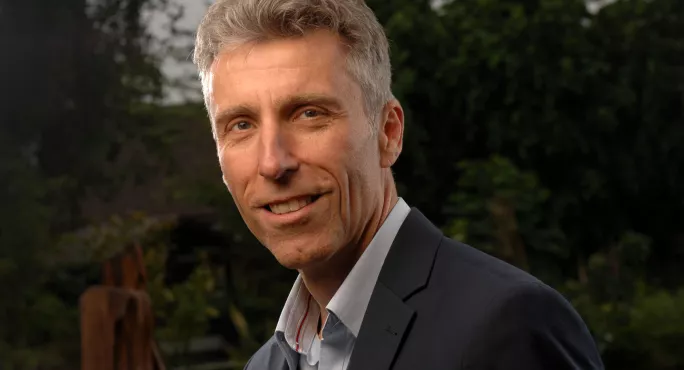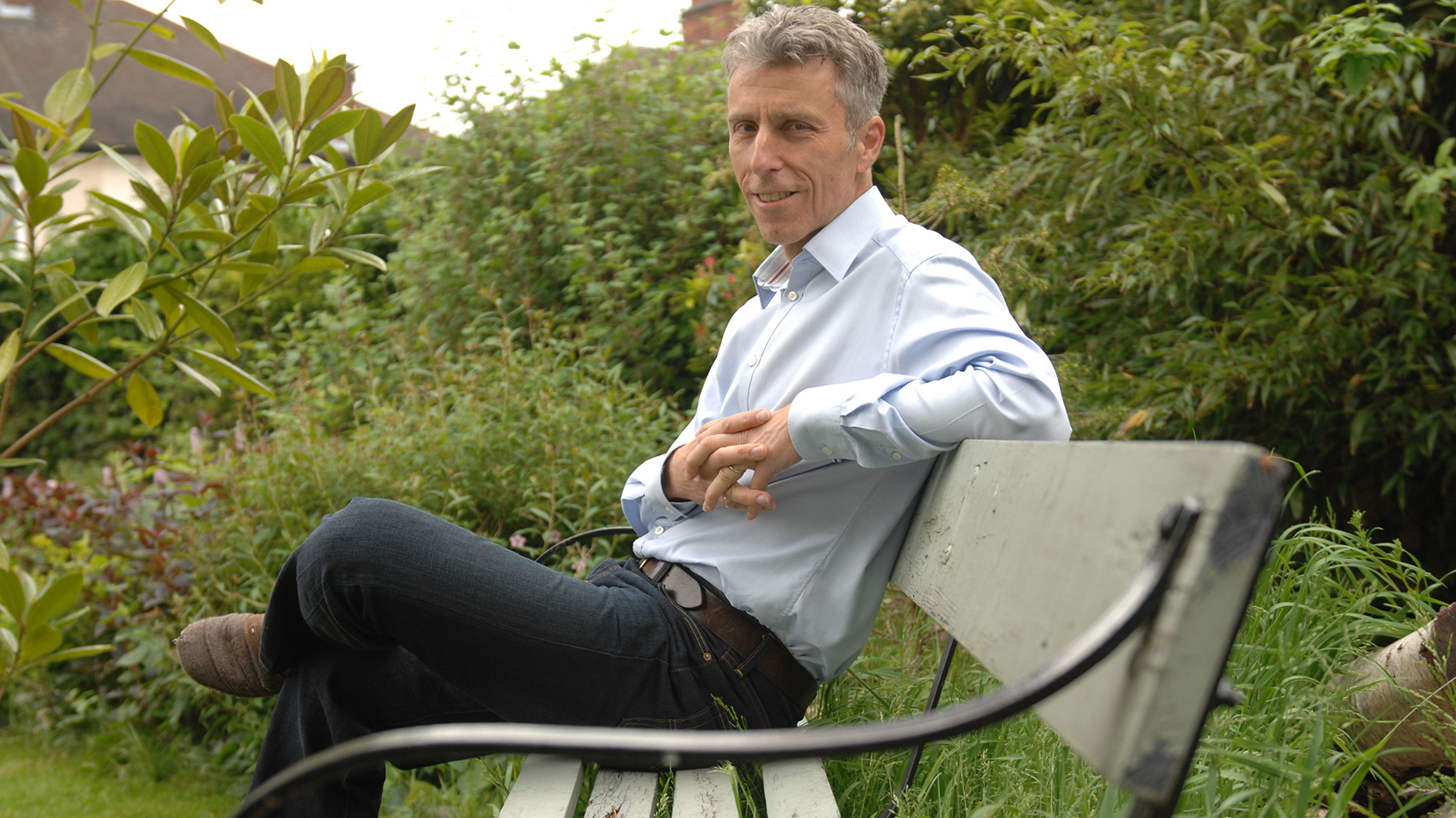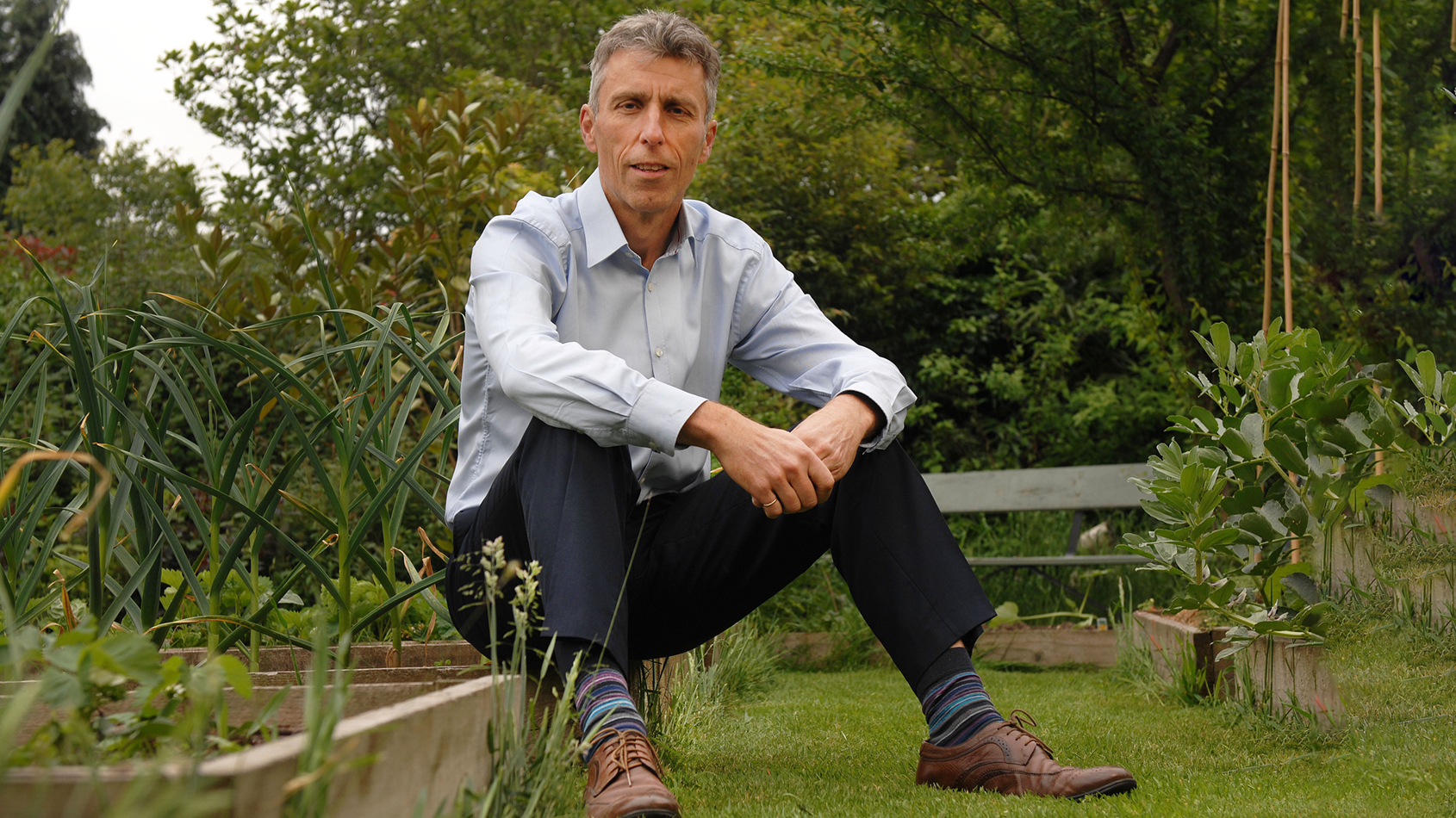Meet David Hughes: Colleges’ biggest cheerleader

When asked who has inspired him the most throughout his life, an answer comes easily to David Hughes.
“At the risk of sounding really cheesy, it’s my mum. She left school at 15 and had four children by the age of 25. She worked incredibly hard to bring us up, and to make sure that we had the right values and believed in ourselves. I am the youngest and was the first to go to university, and I suggested to her that she might want to return to education. She went to night school, got her GCSE French and had GCSE Spanish, and then went on to an access course to get a language degree. She never believed she was clever, and she was 58 when she graduated,” he says.
“I still remember her graduation. My brothers and I went, and it was quite formal, with people clapping politely. When she went up to get her scroll, she turned and waved to us, and we all stood up and cheered her on. It was an incredibly special moment.”
Anyone who knows Hughes won’t be surprised by his reaction at his mother’s graduation. Often, it’s felt as though a huge part of Hughes’ role as chief executive of the Association of Colleges has mirrored that experience: standing up and cheering on those who wouldn’t necessarily cheer on themselves.
And perhaps a point is now being reached where it feels that all the cheering and championing from Hughes and the AoC is starting to pay off. Both prime minister Boris Johnson and education secretary Gavin Williamson have plenty to say about further education and the role colleges will play as we recover from the pandemic. Just last week, the Skills and Post-16 Education Bill formally entered Parliament, setting out major reform for the sector.
Yes, change is coming for colleges: and Hughes is ready for it.
Need to know: The Skills and Post-16 Education Bill
Opinion: FE still finds ways to shine in these dark times
More by David Hughes: Why the SEND review risks failing over 100,000 students
Hughes was born in North London in the mid-60s and has three older brothers. His mother left school at 15 and was just 25 when he was born, and he spent much of his childhood living in a small council flat with her, his siblings and his grandmother.
The influence of a ‘fantastic teacher’
One of his earliest memories - and clearly one that shaped his life - was going with his mum to the council office where she was told she’d have to evict his nan.
“I remember the way we were treated by the council as tenants was really appalling. They told [my mother] she had to get rid of my nan, her mum, who’d been living with us because she’d been made homeless, and they said, ‘You’re overcrowding - you need to get rid of her,’” he says. “So my mum then had to evict her mum, and she was in floods of tears, and there was absolutely zero empathy or even sympathy from the people in the council, and that memory stayed with me.”
At school, there was someone who empathised and supported Hughes. He remembers Harry Mycock, his Year 6 teacher, who understood his boredom and frustration, and knew how to deal with it.
“He became a really close friend as I grew older: he came to my graduation and to my wedding. Harry was a fantastic teacher. He was inspirational, and he knew how to control the class, get everyone motivated and focused. I’ll never forget just how much respect everybody had for him,” he says.
“I loved school, but I used to get really bored and frustrated. When he could sense I was getting restless, he used to send me to the shop with 50p to get him 20 Rothmans. Looking back, there’s a few safeguarding issues there, but it was perfect, because it made me feel special, and he was able to concentrate on the others while I was out of the classroom.”
Hughes passed his 11-plus and went on to the local grammar school. He says he hated his secondary education: it was really busy, but there wasn’t much learning going on, with a focus on memorising and recall. But when he went to sixth form, everything changed: he was treated as an adult, and given much more freedom over his own time and study.

Hughes went on to study geography at Cambridge and chose to build his career in a sector that he’d had first-hand experience of: the housing sector.
Moving into adult education
He started off working for a housing association in Toxteth, Liverpool, and then moved across to work with housing cooperatives. After a while, he realised he was actually working in adult education: supporting tenants with rent, maintenance and training. Keen to broaden his horizons, and having been bit by the lifelong learning bug, Hughes moved to Perth, Australia, and worked as an adult educator in a range of community development roles.
In 1997, Hughes was inspired by David Blunkett’s Learning Age Green Paper: “It described lifelong learning in a way that just excited me” - and he returned home determined to be a part of it.
For the next 20 years, Hughes carved a career with FE and skills at its heart: roles at Nottingham Council and the Local Skills Council were followed by the Education and Skills Funding Agency and the Learning and Work Institute. And in 2016, Hughes was named the Association of Colleges’ new chief executive.
Fighting colleges’ corner
It’s a role that has historically required frequent shouting of “And what about colleges?” when announcements about schools and universities have been made by the government. And finally, it seems the message has got through.
Hughes is clear: the opportunity that the new bill presents must not be taken for granted. When thinking about the biggest regrets in his career, the Learning Age Green Paper is one of them. Not for its content, but for the lack of action taken.
“The vision in that was very similar to the vision of lifelong learning now. And yet we’ve had 20 years of not moving forward, but going backwards,” he says. “The regret is that there were opportunities which we just missed and we lost and millions of people could have had so many more opportunities to learn if the whole education system, politicians and officials had got it right. Now, with the skills bill, we’ve got another chance: we cannot miss this opportunity.”
And although the skills bill brings about a lot of reform for the sector, there’s still more that needs to change, says Hughes.
“I really do love colleges and they’ve been amazing in the last year: look at the shift to online learning, and initiatives like FE Food Bank Friday. They’ve supported the NHS by opening up training facilities to staff, and produced PPE [personal protective equipment] where there have been shortages. They’ve just quietly got on with it, despite everything they deal with,” he says.
“Colleges still operate in a system that’s dysfunctional that hampers and constrains them. They haven’t got anywhere near enough funding. There’s been a 30 per cent cut in funding in a decade. We have to get the chancellor to restore the funding which has been lost. The IPPR [think tank] suggested if funding carried on at the same level as 10 years ago, it would be £5 billion more a year now than it is.
“[If I was education secretary], I’d get a meeting with [chancellor] Rishi Sunak, and convince him the very best investment he could make would be in the education system at all levels, but particularly around FE and skills, and I would not stop until I could persuade him to do it.”
Under Hughes’ leadership, the Association of Colleges commissioned the Independent Commission for the College of the Future, which set out a vision of what colleges should look like by 2030. For Hughes, the key message is the importance of having colleges at the heart of their communities.
Putting colleges at the heart of their communities
“Colleges need to be resilient anchor institutions, real community resources: one in which people don’t just go for a year or two but keep going back to. If people are going to work for over 50 years, they will need to continually think about retraining and updating their skills,” he says.
“A college should be a community hub that you attend, and become an alumnus of the college, so the next time you’re considering a career change, you go back, get some advice and brush up on your skills. For example, plumbers now have to start thinking about learning how to instal heat pumps rather than gas boilers, and their local college should be the place they naturally go to for that training.
“The government needs to respect colleges as much as they do schools and universities. We need three key education institutions, linked together in a community, which can help from cradle to grave.”
That respect seems to be within touching distance, and one thing is for sure: when it comes to championing colleges, Hughes will never sit down quietly, and politely clap. He will be on his feet, cheering them on.
You need a Tes subscription to read this article
Subscribe now to read this article and get other subscriber-only content:
- Unlimited access to all Tes magazine content
- Exclusive subscriber-only stories
- Award-winning email newsletters
Already a subscriber? Log in
You need a subscription to read this article
Subscribe now to read this article and get other subscriber-only content, including:
- Unlimited access to all Tes magazine content
- Exclusive subscriber-only stories
- Award-winning email newsletters
